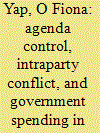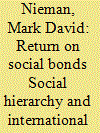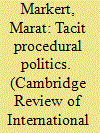| Srl | Item |
| 1 |
ID:
068580


|
|
|
| 2 |
ID:
082408


|
|
|
|
|
| Publication |
2008.
|
| Summary/Abstract |
This analysis examines ballistic missile proliferation in the context of strategic interactions among neighboring states. The analysis finds that when faced with ballistic missile threats, nations respond rationally and acquire ballistic missiles as a deterrent. Using a panel data set of 119 countries from 1967 to 1997, this study shows that the probability of a country procuring ballistic missiles increases nonlinearly as the number of bordering states with ballistic missiles increases. Although international norms arising from the Missile Technology Control Regime reduced the probability of missile proliferation, these externalities did not offset a state's decision to arm in response to ballistic missile arsenals in neighboring states. This analysis also finds that surface-to-air missiles (SAMs) increased the probability of proliferation in two ways: first, because ballistic missiles provided states ``ensured penetration'' of a rival's air defenses; and second, because SAMs reduced the ability of a rival to retaliate against a ballistic missile attack
|
|
|
|
|
|
|
|
|
|
|
|
|
|
|
|
| 3 |
ID:
147835


|
|
|
|
|
| Summary/Abstract |
This article takes a game-theoretic and latent variable approach to modeling the effect of international social hierarchies on conflict among states. I start with the premise that international states are social actors and are nested within informal social networks of friendly and conflictual relationships. Rather than lateral relationships among equals, networks among states tend to have a vertical or hierarchical structure. Although international hierarchical relationships may arise as a result of material power asymmetries, this article focuses on non-material asymmetries that stem from political legitimacy or policy innovation – a subject that has received less attention in scholarly research. I argue that, within these hierarchies, states adopt one of two roles – a dominant or a subordinate. Each resulting (dyadic) dominant–subordinate relationship is a social contract, in which the subordinate concedes some autonomy in exchange for the dominant’s protection. This social hierarchy affects the relationships among subordinates, as well as between a dominant and subordinates. The model predicts that a state’s degree of subordination reduces its probability of conflict initiation against other subordinates. Moreover, the decision to initiate conflict is influenced by the expectation that the dominant will intervene, which itself is affected by the target’s relative level of subordination to the dominant vis-à-vis the challenger. These predictions are supported by empirical analyses of the US hierarchy (1950–2000).
|
|
|
|
|
|
|
|
|
|
|
|
|
|
|
|
| 4 |
ID:
129581


|
|
|
|
|
| Publication |
2014.
|
| Summary/Abstract |
This article analyses the dynamics of procedural politics in the EU's Police and Judicial Cooperation in Criminal Matters across subsequent Treaty regimes (Amsterdam and Lisbon). In the course of legislative policy-making in this area, member states and the European Commission engage in strategic interactions with respect to procedural rules, whereby specifically member states attempt to contain integrationist legislation coming from the Commission through legislative preemption strategies. Drawing on Joseph Jupille's procedural politics approach, the article hypothesizes that member states' strategies are conditioned by several scope conditions, notably jurisdictional ambiguity, influence difference between different decision-making procedures, and prointegrationist case law from the European Court of Justice. I test these hypotheses by analysing the legislative process on a number of selected cases.
|
|
|
|
|
|
|
|
|
|
|
|
|
|
|
|